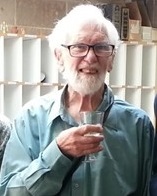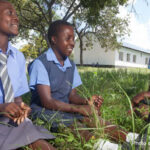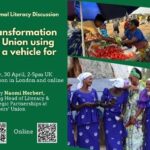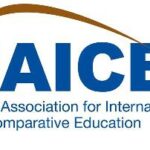This article was published on the University of East Anglia UNESCO Chair in adult literacy and learning for social transformation website on 13 April 2022.
UPDATE: The UNESCO Chair in Adult Literacy and Learning for Social Transformation at the University of East Anglia gathered tributes, memories, stories and photographs of Professor Alan Rogers in a tribute booklet.
It is with great sadness that we heard the news of Alan Rogers’ death on 5 April 2022.
 Alan was appointed Visiting Professor in the School of Education and Lifelong Learning in 2005, and actively engaged in teaching, supervision, research and policy development since that time. He was a founding member of the UEA Literacy and Development Group and contributed greatly to the establishment of the UEA UNESCO Chair in Adult Literacy and Learning for Social Transformation, remaining a key member of the core organising team. In 2006, Alan was instrumental in setting up an MA course in ‘Adult literacy, lifelong learning and development: international perspectives’ – consisting of three separate modules on literacy policy, literacy practice and literacy theory. The course involved visiting local adult literacy projects in Norwich, so that students could reflect on concepts of literacy and adult learning in relation to policy and practice. Several of these MA students went on to conduct innovative research in this area at PhD level.
Alan was appointed Visiting Professor in the School of Education and Lifelong Learning in 2005, and actively engaged in teaching, supervision, research and policy development since that time. He was a founding member of the UEA Literacy and Development Group and contributed greatly to the establishment of the UEA UNESCO Chair in Adult Literacy and Learning for Social Transformation, remaining a key member of the core organising team. In 2006, Alan was instrumental in setting up an MA course in ‘Adult literacy, lifelong learning and development: international perspectives’ – consisting of three separate modules on literacy policy, literacy practice and literacy theory. The course involved visiting local adult literacy projects in Norwich, so that students could reflect on concepts of literacy and adult learning in relation to policy and practice. Several of these MA students went on to conduct innovative research in this area at PhD level.
Before moving into international development, Alan had a long career in local history – and developed a strong interest in medieval history. He taught history in the Department of Adult Education at the University of Nottingham for over 20 years – and became Director of the Institute of Continuing Education at Magee University College in Londonderry, Northern Ireland in 1980. In 1985, he set up his own NGO, Education for Development, working on adult literacy and development training and research projects for over 13 years. Many of us here at UEA worked with him during this period – including on the DFID-funded Community Literacy Project Nepal, which developed theoretical ideas on literacy as a social practice as the basis for a national adult literacy programme. Alan also brought together many policy makers, practitioners and researchers in adult literacy and numeracy through his Uppingham Seminars. These were held on an annual or biennial basis, in his then home-town of Uppingham (later in Reepham, in Norfolk). Rather than having paper presentations, the agenda would be set by the group of around 30 invitees on the first evening around a chosen theme. This was an unusual opportunity for a group of busy policy makers and academics to have an open-ended discussion, offering an important resource in this field.
There are not many of us who can claim to have written an academic ‘best seller’. Alan’s 1986 Teaching Adults book was and is just that – having reached an impressively diverse audience of researchers, adult educators, policy makers and facilitators across the world. Alan had a great gift for writing about (and talking about) complex ideas in an accessible and engaging way – and practising what he preached about adult learning! His students will not forget having to rearrange the room furniture from lecture style to small groups every time they had an MA session with Alan.
Above all, as a founding member of our UEA Literacy and Development Group, Alan played an essential role in the establishment and development of the UEA UNESCO Chair programme. In particular, he strengthened our research direction and capacity building activities in informal learning and literacy, and the professional development of literacy facilitators – both continuing themes within his research and publications. The new Bloomsbury series edited by Alan (and Anna Robinson-Pant) on Adult Literacy, Learning and Social Change will be a rich tribute to Alan’s intellectual influence and drive. It is a pity that he just missed seeing the first two books published in this series by former UEA students Ahmmardouh Mjaya and Fusheng Jia – and at the time of his death, he was finalising a volume (co-edited with Jules Robbins) on Adult Learning and Social Change in the UK: National and Local Perspectives.
We will all miss Alan’s incredible intellectual energy, support and friendship which continued until the end. Only last month, he was saying how much he enjoyed working with our PhD students and was keen to continue his supervisory role despite many health issues. Alan was also a constant mentor to many early career researchers and practitioners in the field of adult learning/literacy, particularly in Ethiopia and other countries where there had been little qualitative research in this area.
The UEA UNESCO Chair will be producing a booklet to remember and reflect on Alan’s life – please feel free to send any memories, photos, reflections to UNESCO Chair unesco.chair@uea.ac.uk (before April 22nd). We will also hold a memorial event in the Autumn as an opportunity to reflect on and celebrate Alan’s remarkable contribution to adult literacy and adult education – in the UK, our UNESCO Chair partner countries and many other contexts across the world.
Anna Robinson-Pant
UEA UNESCO Chair holder
April 2022





